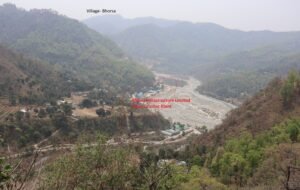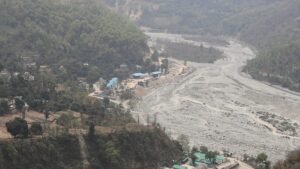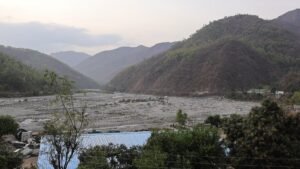Special Team Report- 11 May 2025
Afcons Infrastructure company’s crusher plant is challenging the instructions of NGT, Drashta Foundation sent a report to the Nainital administration
Drashta Foundation has formed a 5-member Central Monitoring Committee and a 3-member local special team to do special study and monitoring of development works, art-culture and tourism in the villages. This team is studying the villages of Uttarakhand. In this context, a basic report is presented on the basis of the complaint of the local people of village Bhorsa.
Location- Village- Bhorsa, Post Office Amritpur, Tehsil-Haldwani, District-Nainital, Uttarakhand- 263126
 Geographical Area- Bhorsa village is located around 29.22° North latitude and 79.52° East longitude, which is near Haldwani city. This village is located at an altitude of about 424 meters above sea level. It falls in the Bhabhar region, where mountain rivers go underground and reappear in the plains of the Ganges. It is the transition zone between the foothills of the Himalayas and the plains of the Ganges. Rivers like Gaula river flow through this area, which are geographically important.
Geographical Area- Bhorsa village is located around 29.22° North latitude and 79.52° East longitude, which is near Haldwani city. This village is located at an altitude of about 424 meters above sea level. It falls in the Bhabhar region, where mountain rivers go underground and reappear in the plains of the Ganges. It is the transition zone between the foothills of the Himalayas and the plains of the Ganges. Rivers like Gaula river flow through this area, which are geographically important.
Bhorsa village is called the gateway of Kumaon. This village is in the vicinity of Nainital road and Gaula river, which makes it an important link between the hilly areas and plains of Kumaon.
Distance from the city- Bhorsa gram sabha is 15 kms. north-east of the village on paved and unpaved road.
Population- There are 119 families in Bhorsa village whose population is around 700.
What is the problem?
Afcons Infrastructure Company has illegally set up a crusher plant near a populated area, flouting environmental laws. Jamrani Dam is being constructed 1.5 km away from the populated area. In the process of setting up the stone crusher unit in the Gaula river bed, Afcons Infrastructure Company has clearly violated statutory environmental norms.
Its operation will undoubtedly increase the already severe noise and air pollution levels, causing unbearable suffering to the villagers. We are currently facing significant difficulties, and the commencement of stone crusher activities will only increase this suffering manifold. We firmly believe that the location of a stone crusher so close to a residential area would be inherently harmful as it would generate inevitable air and noise pollution. Worryingly, the distance between residential houses and the offending stone crusher unit is just a few meters.
This illegal activity involves hundreds of heavy vehicles, including trucks, dumpers and small commercial vehicles, operating from 4:30 am to midnight. As a result, the 7 km long road connecting Bhorsa gaon to Bhimtal Road has turned into a dangerous state with several large potholes, making it nearly impossible for pedestrians and vehicles alike to pass through. The resulting noise pollution has made it virtually impossible to lead a peaceful life in the area, which is further aggravated by the dangerous levels of air pollution prevailing throughout the day and night.
Number and health condition of the elderly – Around 190 of them are senior citizens who are already suffering from various ailments including asthma.
Gram Sabha has not given the No Objection Certificate-
 No objection from local families or landowners is necessary to set up a plant at a distance of 500 meters from the population, but Afcons Infrastructure Company has set up a crusher plant in violation of the rules and regulations of environmental protection. Therefore, the members of the Gram Sabha have not given the No Objection Certificate to Afcons Infrastructure Company.
No objection from local families or landowners is necessary to set up a plant at a distance of 500 meters from the population, but Afcons Infrastructure Company has set up a crusher plant in violation of the rules and regulations of environmental protection. Therefore, the members of the Gram Sabha have not given the No Objection Certificate to Afcons Infrastructure Company.
Violation of Gram Sabha rights
The plant set up by Afcons Infrastructure Company without the No Objection Certificate of the Gram Sabha is illegal. And this is a violation of the rights given to the Gram Sabha in Panchayati Raj as per the 11th Schedule of the Constitution.
Rules for setting up a crusher plant in Uttarakhand-
-Minimum 500 meters from public religious places, schools, educational institutions, hospitals, nursing homes, and population.
-Forest area/sanctuary: More than 1 km.
-National/State Highway- 200-500 meters.
-Rivers/water bodies: 500 metres.
Uttarakhand-specific rules
Several legal rules and regulations apply to setting up and operating crusher plants under the guidelines of the Uttarakhand Pollution Control Board (UKPCB) and the National Green Tribunal (NGT). These guidelines apply under the Environment (Protection) Act, 1986, the Air (Prevention and Control of Pollution) Act, 1981, the Water (Prevention and Control of Pollution) Act, 1974 and other related laws. Also, NGT orders and State Pollution Control Board (SPCB) regulations govern their operations. These regulations are designed to ensure environmental protection, pollution control and sustainable development.
Himalayan ecology: Uttarakhand has additional restrictions on crusher plants due to the sensitivity of the Himalayan region. For example, no industrial activity can take place in the eco-sensitive zones in Nainital and other hilly areas.
Plastic Waste Management: The Uttarakhand High Court and UKPCB have imposed strict rules on the disposal of plastic waste, which also apply to crusher plants.
Organic State: Under the policy to make Uttarakhand an organic state, there is strictness on chemical pollution, which also affects crusher plants.
Penalties and Penalties
Non-compliance: Operating without CTE/CTO or environmental clearance can attract a penalty of up to Rs 10 crore and imprisonment of up to 3 years (under the Environment Protection Act, 1986).
Polluter Pays Principle: Compensation and penalty will have to be paid for environmental damage.
Plant Closure: Illegal or non-compliant crusher plants can be closed immediately on the orders of NGT and UKPCB.
Illegal mining and legal action-
-In 2020, the High Court also banned the issuance of new licenses for stone crushers not meeting the standards.
-Illegal mining or violation of rules can lead to heavy fines and plant seizure. For example, a fine of Rs 52 lakh was imposed on 4 stone crushers and 2 mining leases in Haldwani.
Conclusion-
The sites of the crusher plant set up by Afcons Infrastructure Company have been inspected. The special team has also done video photography of the surrounding areas. Talked to the villagers and also heard their complaints. The special team found that to set up the crusher plant, the company has flouted the guidelines of NGT and UKPCB by ignoring environmental protection.
 Questions based on the report-
Questions based on the report-
1- Has administrative permission been given to Afcons Infrastructure Company to set up a crusher plant in Bhorsa rural populated area? If given, then…
2- Has the administration followed the major legal rules and guidelines of (UKPCB) and National Green Tribunal (NGT) for the crusher plant in Uttarakhand?
3- Has the concerned departments of the administration checked the No Objection Certificate received from the Gram Sabha before giving license and permission to Afcons Infrastructure Company?
4- Which concerned departmental officers of the administration have inspected the crusher plant of Afcons Infrastructure Company located in Bhorsagaon and checked the mandatory rules for the license?
5- If the administration has not given permission to Afcons Infrastructure Company to set up a crusher plant in a populated area and river, will the administration take legal action against the company?
Bhorsa Gram Panchayat-Report with complaint


